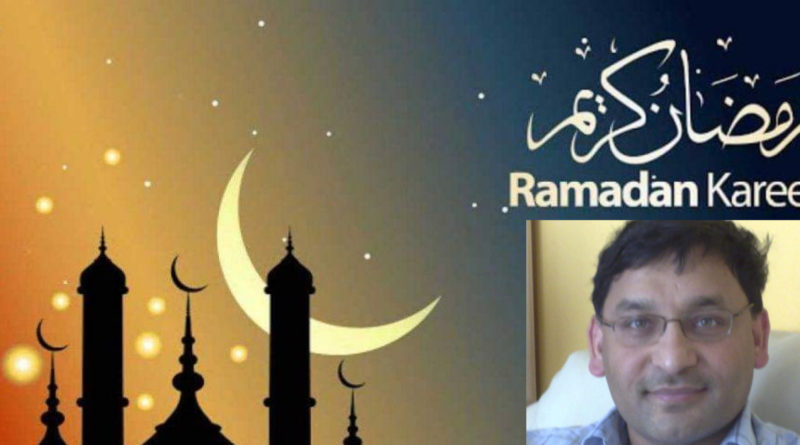COVID-19 and Ramadan 2020
Sadequl Amin:
Ramadan 1441 Hijri is the year 2020 AD according to the Gregorian calendar. Globally, approximately 1.8 billion Muslims are observing the holy month of Ramadan which is the ninth month of the Islamic calendar. The Muslims amid the worldwide COVID-19 outbreak are fasting a period of 29 or 30 days to increase their awareness of God.
The World Health Organisation (WHO) says that COVID-19 is an infectious disease caused by the most recently discovered coronavirus. The outbreak was identified in China, Wuhan, the capital city of Hubei province in December 2019. The WHO declared the outbreak a public health emergency of international concerns on 30 January 2020. It was then recognised as a pandemic on 11 March 2020. So far, the virus has affected 215 countries and territories around the world.
According to Worldometers, on 01 May 2020 at 16:11 GMT, global total coronavirus cases were 3,341,005, the number of deaths 235,926 and the number of people recovered 1,057,240.
Astonishingly, social media is inundated with conspiracy theories by so-called experts about coronavirus. Some of the theories are: 5G, vaccination, implantable microchips, digitalisation of currency, mass surveillance, depopulation program and many others that are causing confusion, anxiety and misunderstanding.
Besides this, many pundits and experts in the fields of virology, microbiology, immunobiology, epidemiology, vaccinolgoy, economy, politics, technology and eschatology are also providing explanations in relation to the theories about COVID-19, its origin and how it spread from the city of Wuhan in China.
In the meantime, many leaders of the world including US President Donald Trump, UK Prime Minister Boris Johnson and French President Emmanuel Macron have declared COVID-19 as “the invisible enemy”.
Surprisingly, in a recent daily White House Press briefing, President Donald Trump suggested treating coronavirus by injecting disinfectant and said, “ … is there a way you can do something like that, by injection inside, or almost a cleaning?” Later, he said he was being sarcastic.
Despite this toxic suggestion, there is a hope that the human ingenuity will come up with a vaccine. Scientists all over the world are working tirelessly. As part of this endeavour, Professor Sarah Gilbert, who is a Professor of Vaccinology at Oxford University, and her team started a human trial and said a vaccine will be ready by September. At the same time, another team led by Professor Robin Shattock, who is the head of Mucosal Infection and Immunity at Imperial College London, hopes to begin human trials of its coronavirus vaccine in June.
In addition, Dr Gao Fu, a leading virologist who is the head of China’s Centre for Disease Control, says a Covid-19 vaccine could be ready for “emergency” use by September.
At present, majority of the world’s population in their respective countries are in an unprecedented full or partial lockdown. Some of the lockdown measures include: stay at home – except for very limited purposes, social distancing – stay 2 metres (6ft) away from other people at all times and stopping all gatherings of more than two people in public.
In these unusual circumstances, Muslims all over the world have started to fast which is one of the five pillars of Islam. During the time of fasting, one abstains from food, drinks and sensual contact. It is a form of deeply personal worship which is intended to raise the level of closeness to God.
For Muslims, fasting is ordained in the Quran: “O you who believe! Fasting is prescribed to you as it was prescribed to those before you, so that you might remain conscious of God!” [Al-Baqarah, 2:183]
The relationship between Ramadan and the Quran is mentioned in the verse: “Ramadan is the (month) in which was sent down the Quran, as a guide to Mankind, also clear (signs) for guidance and judgement (between right and wrong).” [Al-Baqarah, 2:185]
The main goal of fasting is to develop awareness of God – Taqwaa. This is connected to the heart. It is reported in a hadith that the Prophet Muhammad (pbuh) used to point to his chest and say: “Here lies Taqwaa.” [Muslim, Al-Tirmidi and Ahmed]
Furthermore, the characteristics of the God-fearing people are stated in the Quran: “who believe in the unseen, are steadfast in prayer and spend out of what We have provided for them. And who believe in what has been revealed to you, [O Muhammad], and what was revealed before you, and of the Hereafter they are certain [in faith].” [Al-Baqarah, 2: 3-4]
This year’s Ramadan is not like the previous years. Due to the lockdown measures, places of worship, including Masjids, remain closed for congregational prayers such as the five daily obligatory prayers, Friday Jummah and Taraweeh. Similarly, communal iftars will not take place in the Masjids and other public places.
However, during this Ramadan majority of the world’s Muslims will pray their daily and additional prayers at home. They will either pray individually or in Jama’ah with their families. In these exceptional circumstances, in order to increase awareness of God, Muslims will perform more acts of worship and especially pray for humanity to emerge from the coronavirus pandemic.
Rewards for a fasting person are unique. In a hadith the Prophet (pbuh) said, “(Allah said), ‘every good deed of Adam’s son is for him except fasting; it is for Me and I shall reward (the fasting person) for it.’ …” [Al-Bukhaari and Muslim]
Let us hope that this Ramadan will be a rewarding month for us all. We hope to strive to increase our awareness of God. Together, we pray for the safety of everyone, for protection from coronavirus, for a return back to normality and to live in peace and harmony.
